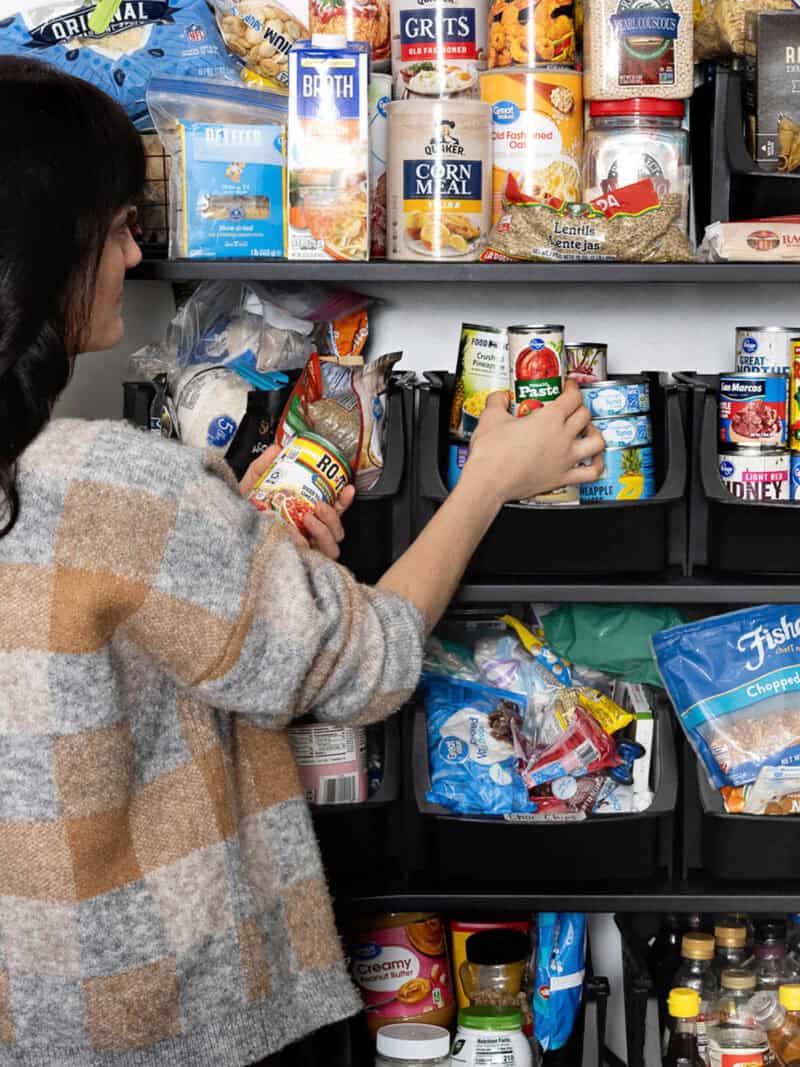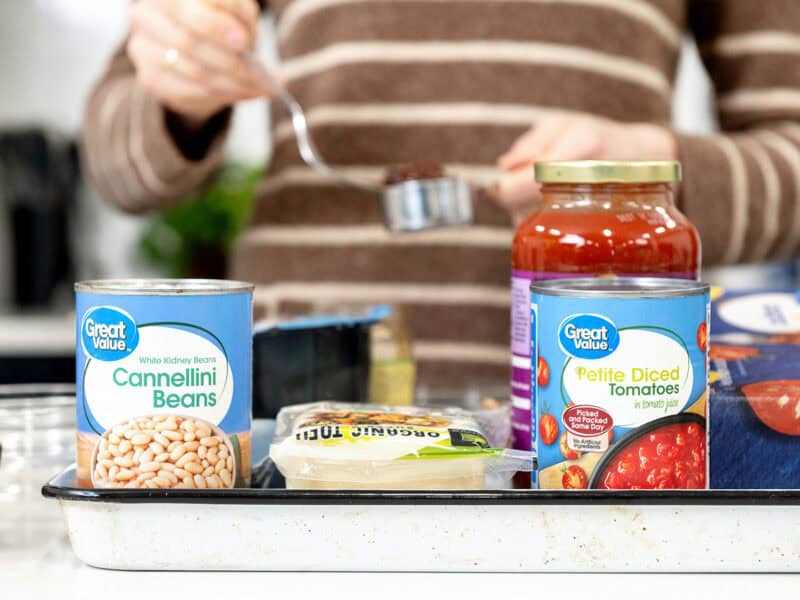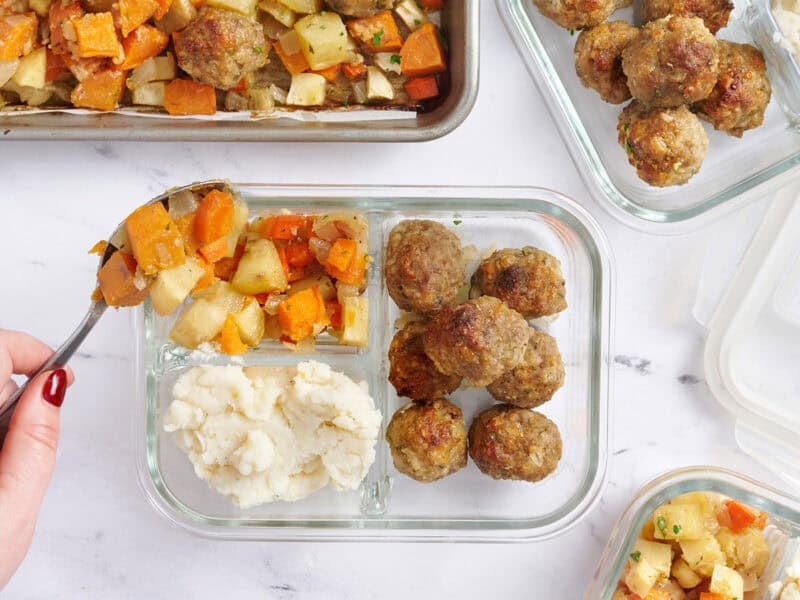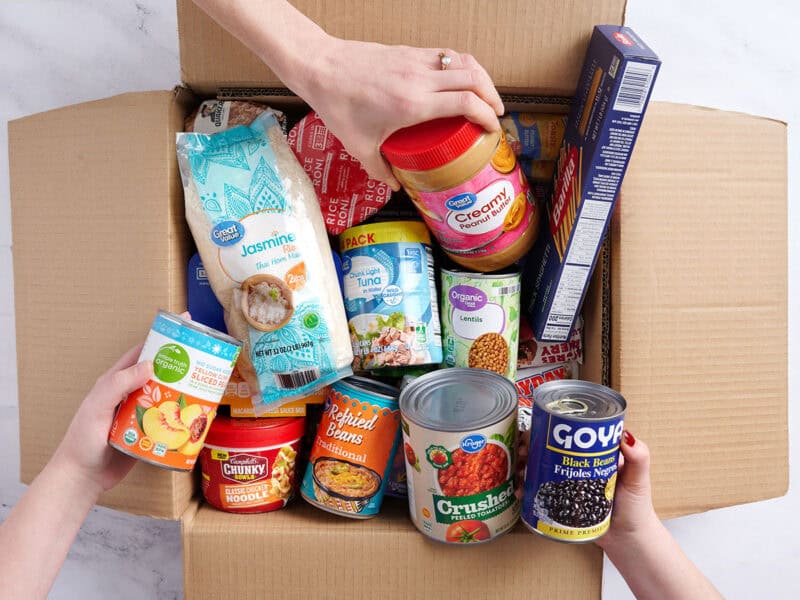Hey Budget Bytes community, Jess here.
Our team always wants this space to be a comfort zone; a place to find delicious, affordable food that makes your life a little easier. But sometimes, being a voice for budget-conscious living means having a hard conversation about the realities of keeping food on the table.
Right now, a lot of us are facing uncertainty, and I want to address the elephant in the kitchen: the potential disruption to SNAP benefits in November 2025 due to the current government shutdown.

All recipes are rigorously tested in our Nashville Test Kitchen to ensure they are easy, affordable, and delicious.
TLDR: Shelf-Stable Strategies for SNAP Disruptions
• SNAP Benefits Delays: States have already received notice that November 2025 benefits will not be issued, or will be paused, unless funding is resolved. Make sure your paperwork is up to date to avoid further delays.
What to Do Now:
- Prioritize pantry staples like beans, rice, canned goods, and frozen proteins.
- Reach out to local food resources like food banks if you need help.
How You Can Help:
- If you’re not affected, donate money or food to food banks, volunteer, or support neighbors with meals or transportation.
- Call your Representatives and Senators and urge them to pass standalone SNAP funding or a full measure that protects nutrition assistance now: 202-224-3121
- We’ll Get Through This Together: It’s okay to ask for help during tough times. Lean on your community, and let’s support each other as we navigate through this uncertainty.
The Latest Update on SNAP Benefits
Here’s what’s happening. The Supplemental Nutrition Assistance Program (or SNAP, formerly known as “food stamps”) is being directly affected by the current federal government shutdown. The U.S. Department of Agriculture (USDA), which runs the program, has instructed state agencies to hold November issuance files until Congress passes a funding plan. That means:
- Many households may not receive benefits next month unless Congress acts.
- States have already received notice that November benefits will not be issued, or will be paused, unless funding is resolved.
- October benefits have already been issued, so you can and should use the funds currently available on your EBT card. October benefits were loaded before the shutdown and are still valid, but future months are uncertain.
- Stay up to date on your paperwork. States are still processing new SNAP applications and renewals, so make sure your information is current to receive benefits quickly once funding resumes.
SNAP is a crucial resource for around 42 million Americans each month. If you have been following Budget Bytes for a long time, you know we are passionate about raising awareness when it comes to food insecurity and trying to help stretch every dollar. If this uncertainty has you feeling anxious, that’s completely understandable. For updates specific to your area, check your state’s Department of Human Services (DHS) or Department of Social Services (DSS) website—they’ll have the most accurate, local information. Many states have specifically posted hold notices for November benefits. For example, Maine’s DHS has said November benefits cannot be issued until the shutdown ends.

If You Use SNAP and Need Help NOW
This community is built on feeding each other well while making the most of every dollar, and now’s the time to put that resourcefulness to work. I don’t know about you, but when simply putting one foot in front of the other feels like an impossible task, I ask for help. We’re here for you, and I truly believe our Budget Bytes community is here for each other!
If you’re worried about a gap in benefits, here are a few steps you can take right now.
1. Prioritize Your Pantry
If you have remaining funds on your EBT card, plan carefully. Focus on items that last a long time, are filling, and pack solid nutrition.
- Pantry staples: dry beans, lentils, rice, pasta, shelf-stable milk (powdered or boxed), and canned goods like tuna, chicken, and vegetables.
- Freezer-friendly proteins: buy meat or poultry in bulk, divide into smaller portions, and freeze them for later.
- Be strategic: track prices, buy store brands, and focus on versatile ingredients that can stretch into multiple meals.
Need some recipe inspiration? Our Vegetarian Chili has a high yield and can easily be turned into a variety of meals. If you need more convincing, it also freezes extremely well! Vegetarian Nachos? No problem. Chili dogs? Coming right up. Protein-packed breakfast burrito? You bet. We also have a lengthy list of recipes for under $5 on the blog to give you more ideas.

2. Connect with Local Food Resources
Local organizations are the first to step up when there’s a disruption like this. If you need help, reach out now to local food banks, community fridges, and faith-based pantries so you know your options ahead of time.
- Call 211: This national helpline connects you to local resources for food, housing, and other essential services.
- Visit FindHelp.org. There, you can enter your zip code and find free or reduced-cost resources like food, housing, financial assistance, health care, and more.
- Use the Feeding America Food Bank Locator: Enter your ZIP code to find food pantries, soup kitchens, and mobile pantries near you. (We love Second Harvest Food Bank here in Middle Tennessee.)
- Check community and faith organizations: Many churches and community centers run smaller pantries that might not appear in national databases.
If You’re Not Affected: How You Can Help

If your food budget is steady right now, you can make a big difference for neighbors and families who are struggling.
1. Donate to Food Banks
- Cash donations go the farthest. Food banks can buy in bulk and often get fresh produce, dairy, and protein that pantries can’t always stock through canned donations.
- Food Banks are already under strain and may not be able to replace SNAP benefits, so the urgency is high!
- If you prefer to donate food, the highest-need items are:
- Peanut butter
- Canned meats (tuna or chicken)
- Baby formula and diapers
- Shelf-stable milk
- Hygiene products (soap, shampoo, toothpaste)
2. Volunteer Your Time
Food banks and pantries are overwhelmed with demand and often short-staffed.
- Offer a few hours to help sort donations, pack boxes, or distribute food.
- Contact your local food bank to see what kind of help they need most.

3. Support Your Neighbors
Sometimes the best help is personal. Check in with friends, neighbors, or coworkers who might be affected.
- In addition to SNAP benefits being disrupted, grocery prices are through the roof right now and federal workers are going without pay. Reach out to your neighbors who might be affected by any of these stress factors.
- Offer to drop off a meal—double a Budget Bytes recipe or try meal prepping and share!
- Offer a ride to a food pantry or pickup site if transportation is a barrier.
- Bring back bartering! I trade my neighbor BJ farm fresh eggs in exchange for herbs and spices she grows and dehydrates.
- Make sure you are registered to vote and educate yourself on upcoming local, statewide, and national elections that might affect you and your neighbors access to food and other basic needs.

We’ll Get Through This Together
The stigma around asking for help is real, even though it shouldn’t exist. There’s this myth that food banks are “only for people who are really desperate,” but that’s just not true. Life happens—jobs end, bills pile up, benefits get delayed—and everyone deserves access to good, nourishing food. Food banks and community programs exist because we all need support sometimes. There’s no shame in using the resources that are there to help you get through a tough spot.
Think of it this way—you’re doing what good cooks do best: making the most of what’s available. Leaning on your community doesn’t mean you’ve failed; it means you’re smart enough to reach for the tools that keep you moving forward. These tough seasons don’t last forever, and they don’t define you. You’re still doing your best, and that’s enough.
This community is strong because we care about making good food affordable and accessible—and because we take care of each other. SNAP is an essential support system for millions of families, and while this uncertainty is stressful, we can get through it by planning ahead, sharing what we can, and keeping that sense of community alive.
Like I urged in my last SNAP post over the summer when we first heard about the looming SNAP cuts and restrictions, now is the time to speak up (and vote!). Contact your state reps if you’re worried about how these changes could affect you or your community. A U.S. Capitol Switchboard operator can connect you directly with the Senate office for your state: (202) 224-3121. Your engagement is critical to shaping policy outcomes.
Stay safe, and keep cooking,
Jess
SOURCES:
- https://www.fns.usda.gov/snap/supplemental-nutrition-assistance-program
- https://www.usda.gov/
- https://apnews.com/
- https://www.reuters.com/
- https://www.211.org/
- https://www.feedingamerica.org/find-your-local-foodbank
- https://www.secondharvestmidtn.org/
- https://866ourvote.org/
- https://www.npr.org/2025/10/24/g-s1-94806/government-shutdown
- https://www.maine.gov/


Thank you so much for addressing this – it’s so important!
Little Free Pantries may not always be listed under food banks on food finding sites. They can be hit or miss but they are another available resource.
Good point, thank you for contributing!
Thank you for this post! I would like to also recommend canned tomatoes, flour, and yeast as pantry staples for hard times. There are some fantastic bread recipes in the archive here that can cover a week’s worth of breakfast or help stretch simple meals.
Canned pineapple in juice is usually pretty inexpensive (especially store brands) and versatile. Same for sweet potatoes this time of year in many places; not quite shelf stable but they’ll last for months in cooler temperatures and are versatile and nutritious.
These are all great suggestions. Thank you for contributing!
Proud of you guys for tackling such a difficult topic. This is great information.
I’ve been following Budget Bytes for years and I logged in to say I really appreciate this post! It helped me understand the situation and I’m going to support my local food bank. I know the post is different than usual, thank you for making it!